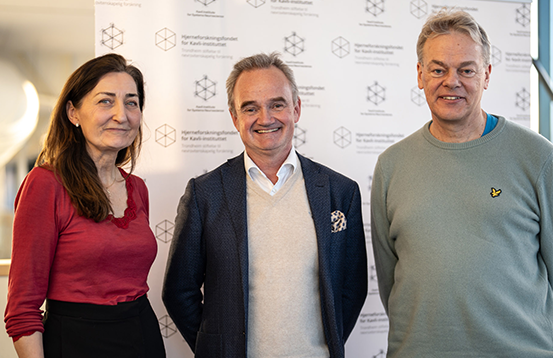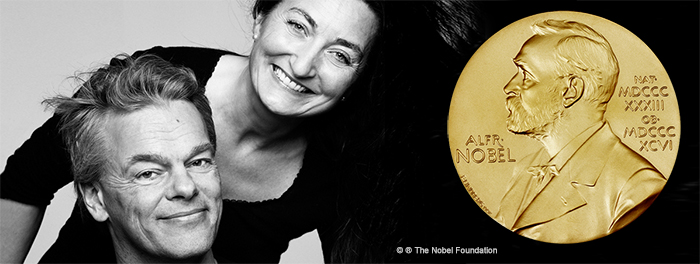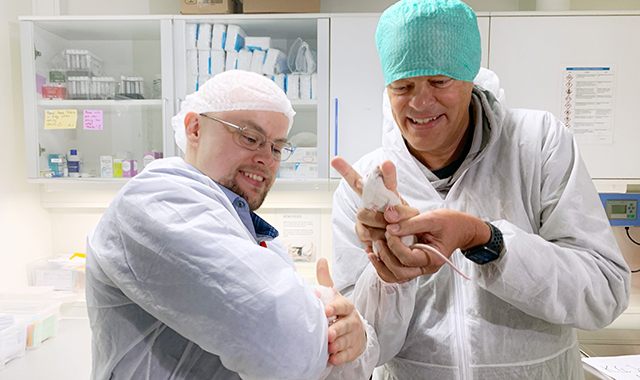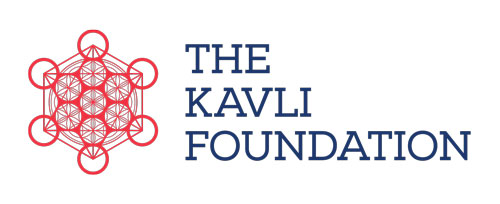Support us - The Kavli Institute for Systems Neuroscience
Support our brain research
We appreciate all support and it is very important for our research
As a company, organization or private actor you can help ensure high quality brain research at the Norwegian University of Science and Technology (NTNU). Private support is valuable financial contribution to a research community and is also experienced as recognition and motivation.
Research funding without special commitments means a lot for the research at the Kavli Institute for Systems Neuroscience. About 40 percent of the Institute's income is linked to specific research projects, most of which come from the Research Council of Norway and the European Research Council.
The greater the income without commitments, the greater the opportunities for new research initiatives that in the long term can receive funding from others. Therefore, the strengthening of the research fund of the Kavli Institute for Systems Neuroscience, The Research Fund of the Kavli Institute for Systems Neuroscience, means a lot to achieve the goals we have set.
- May-Britt Moser and Edvard Moser
The Research Fund of the Kavli Institute for Systems Neuroscience is certified as equivalent to a U.S. public charity. An ED certificate for TFSR is available from NGOsource.
Here's how you can contribute
Everyone can support the brain research at the Kavli Institute. We receive monetary gifts from individuals, companies and organizations, as well as bequests.
All gifts are greatly appreciated and are very important for the fund and he research at the Kavli Institute for Systems Neuroscience.
Support our brain research now
Donate by Vipps: 696680
Donate by bank: 4202 17 13168
Memorial gifts
Bequests
Current affairs
Our research on Alzheimer's
SUPPORT THE BRAIN RESEARCH
Donate by Vipps
Hjerneforskningsfondet Vipps: 696680 (UNIFOR):

Donate by bank
The foundation’s bank account:
4202 17 13168
Follow us on social media
Who has contributed to The Research Fund?
A good 40 per cent of the contribution to the Fund come from the Kavli Foundation in the USA and the remaining almost 60 per cent from other organizations and individuals (April 2023).
We receive monetary gifts from individuals, companies and organizations, as well as bequests. Not everyone wants to make the contribution public, which we of course respect. All gifts are greatly appreciated and are very important for the fund and the research at the Kavli Institute for Systems Neuroscience.

50 MNOK from Sparebank1 SMN
- In February 2024, we at Sparebank 1 SMN gave our largest single grant of 50 MNOK to the brain research at the Kavli Institute in Trondheim.
With the Nobel Prize winners Edvard Moser and May-Britt Moser at helm, we have world-leading environment for brain research here in Trondheim. We want to support and further develop this! At Sparebank1 SMN we are owned by society, a full 42% is society’s rightful share of us. That’s why we give it back to our region. The support for the Research Fund of the Kavli Institute and the research that Edvard and May-Britt are spearheading is our way of contributing to outstanding research that may be able to solve the Alzheimer’s puzzle!
Jan Frode Janson, CEO Sparebank1 SMN
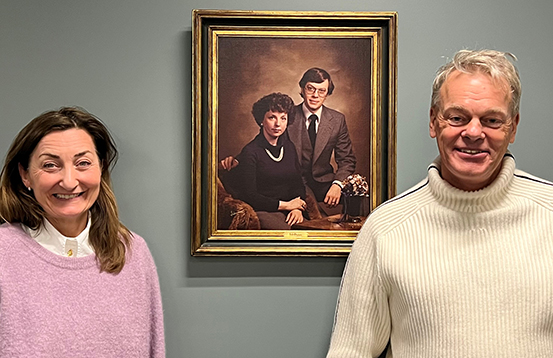
Bequest from Margaret and Per Fuchs
In the summer of 2022, the Research Fund of the Kavli Institute for Systems Neuroscience received a large bequest from Margaret and Per Fuchs, who bequeathed housing and other assets to support the research at the institute. Margaret died in 2019 and Per in April 2022.
With his professional background in flow engineering and fluid mechanics from NTH and later SINTEF, Per Fuchs was central to the design and realization of the large multiphase laboratory at Tiller near Trondheim, a facility that has meant a lot to the development of profitable Norwegian offshore oil and gas production. Per Fuchs moved to Equinor where he held various positions in Equinor's research environment, including as a specialist and chief scientist.

Anne-Lise og Erik Solberg Research Fellow
In 2019 Anne-Lise and Erik Solberg gave a large gift to the Research Fund which finances a permanent research position at the department, Anne-Lise and Erik Solberg scholarship holder.
Erik, who left us in 2022, was CEO at Ila og Lilleby Smelteverker and a civil engineer from NTH in 1958. This means that he must have had some overlapping study years with Fred Kavli, the founder of the Kavli Foundation and the very backbone of the Kavli institutes around the world. It is interesting that both Erik and Fred became industrial leaders who in their respective ways contributed to technological development. Perhaps no coincidence that it is such people who understand the importance of basic research?
To the top against Alzheimer's
- support research in search for a cure
We cheer on the fundraising campaign of Nils-Jarle Sætre! He has walked in memory of his mother, Jorunn Ingerd Sætre, who was affected by Alzheimer's disease. The summer of 2023 we cheered Nils-Jarle through Lofoten and up to Sørøya in Finnmark, and in 2021 from Stadt to Galdhøpiggen.
He has a strong desire to create transparency about the disease and help those who are and will be affected. During his trips, he has met many people, struck up a conversation, shared thoughts and stories as well as given several strong and moving lectures. What a fantastic commitment!
He also have a concrete goal of collecting one million norwegian kroner for the basic research at the Kavli Institute.
Take a look at tiltoppsmotalzheimer.no

Annual gift from Stjørdal Arbeiderkvinnelag
Stjørdal Arbeiderkvinnelag has gifted TFSR 10,000 NOK every year since 2015. Jorun Tyholt, Chairman of the Board of Stjørdal Arbeiderkvinnelag, says that they first became aware of the brain research at the Kavli Institute after the Nobel Prize in 2014. She says that the association mostly consists of elderly ladies who understand the importance of brain research and research on Alzheimer's and dementia. A few years ago, they were invited to the Kavli Institute, where they had a nice evening with a conducted tour and a lecture on brain research, something they really appreciated.

Contribution to new center
100 million in gift to the Mosers
The English woman Pauline Braathen donates NOK 50 million to a new center at the Kavli Institute for Systems Neuroscience at NTNU. In addition, the Kavli Foundation provides NOK 50 million.
Norwegian Sci Tech: Mosers, Kavli Institute given multimillion grant to establish a new centre of excellence
Watch the video where Pauline Braathen explains why she gives money to the center (3:03)

Ensliges Landforbund donated their fortune to Alzheimer’s research
Ensliges landsforbund, an organization supporting seniors living alone, has donated their entire fortune to research on Alzheimer's disease at the Kavli Institute.
- With an increasing elderly population, Alzheimer's is also a growing problem, says the Chairman of the Board of Ensliges Landsforbund, Marie Synnes.
The money that was donated are placed in the research fund of the Kavli Institute (TFSR) and will contribute to financial support for research in the years to come.
- Such permanent gifts make it possible to invest long-term, says May-Britt Moser. According to Marie Synnes and Ensliges Landsforbund, there no cause more deserving of support than Alzheimer's research.

In autumn 2023, the world's best mum, Åse Brunstad, died
She was the most caring, selfless and kind-hearted person I knew, she took care of everyone! The injustice felt great when er began to sense something wrong. The always structured lady no longer had 100% control. The diagnosis came: Alzheimer’s. -We will manage this too, she told me.
Alzheimer’s is a vicious disease, it is cruel to see a loved one lose themselves. Fortunately, mum was happy until the end and we had a lot of fun together. If we asked if she was ok, she always replied yes. But the thought of what she could have had, the things she struggled with and what she could never do, it cuts to the heart.
The choice was easy as I was going to celebrate my 50th birthday. The gift was, of course to go towards research into Alzheimer’s and Moser. The hope is that one day they will find the answer to the riddle, and that no one else have to bear the burden of Alzheimer’s. Good luck and thank you for what you have done so far.
Marit Brunstad

